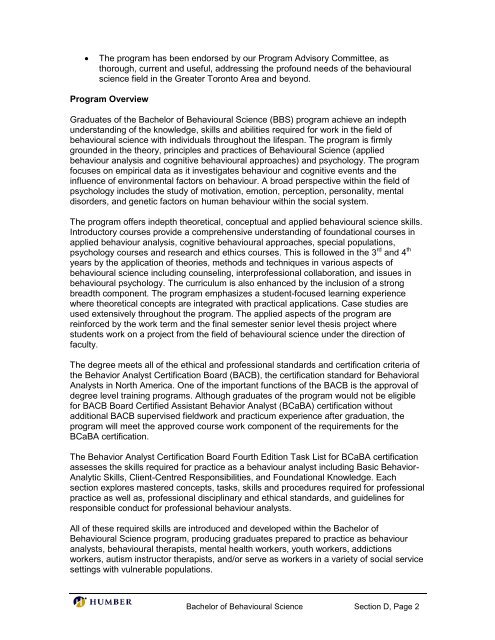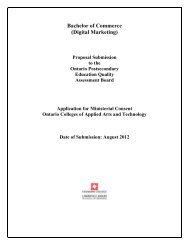Bachelor of Behavioural Science - Postsecondary Education Quality ...
Bachelor of Behavioural Science - Postsecondary Education Quality ...
Bachelor of Behavioural Science - Postsecondary Education Quality ...
You also want an ePaper? Increase the reach of your titles
YUMPU automatically turns print PDFs into web optimized ePapers that Google loves.
The program has been endorsed by our Program Advisory Committee, as<br />
thorough, current and useful, addressing the pr<strong>of</strong>ound needs <strong>of</strong> the behavioural<br />
science field in the Greater Toronto Area and beyond.<br />
Program Overview<br />
Graduates <strong>of</strong> the <strong>Bachelor</strong> <strong>of</strong> <strong>Behavioural</strong> <strong>Science</strong> (BBS) program achieve an indepth<br />
understanding <strong>of</strong> the knowledge, skills and abilities required for work in the field <strong>of</strong><br />
behavioural science with individuals throughout the lifespan. The program is firmly<br />
grounded in the theory, principles and practices <strong>of</strong> <strong>Behavioural</strong> <strong>Science</strong> (applied<br />
behaviour analysis and cognitive behavioural approaches) and psychology. The program<br />
focuses on empirical data as it investigates behaviour and cognitive events and the<br />
influence <strong>of</strong> environmental factors on behaviour. A broad perspective within the field <strong>of</strong><br />
psychology includes the study <strong>of</strong> motivation, emotion, perception, personality, mental<br />
disorders, and genetic factors on human behaviour within the social system.<br />
The program <strong>of</strong>fers indepth theoretical, conceptual and applied behavioural science skills.<br />
Introductory courses provide a comprehensive understanding <strong>of</strong> foundational courses in<br />
applied behaviour analysis, cognitive behavioural approaches, special populations,<br />
psychology courses and research and ethics courses. This is followed in the 3 rd and 4 th<br />
years by the application <strong>of</strong> theories, methods and techniques in various aspects <strong>of</strong><br />
behavioural science including counseling, interpr<strong>of</strong>essional collaboration, and issues in<br />
behavioural psychology. The curriculum is also enhanced by the inclusion <strong>of</strong> a strong<br />
breadth component. The program emphasizes a student-focused learning experience<br />
where theoretical concepts are integrated with practical applications. Case studies are<br />
used extensively throughout the program. The applied aspects <strong>of</strong> the program are<br />
reinforced by the work term and the final semester senior level thesis project where<br />
students work on a project from the field <strong>of</strong> behavioural science under the direction <strong>of</strong><br />
faculty.<br />
The degree meets all <strong>of</strong> the ethical and pr<strong>of</strong>essional standards and certification criteria <strong>of</strong><br />
the Behavior Analyst Certification Board (BACB), the certification standard for Behavioral<br />
Analysts in North America. One <strong>of</strong> the important functions <strong>of</strong> the BACB is the approval <strong>of</strong><br />
degree level training programs. Although graduates <strong>of</strong> the program would not be eligible<br />
for BACB Board Certified Assistant Behavior Analyst (BCaBA) certification without<br />
additional BACB supervised fieldwork and practicum experience after graduation, the<br />
program will meet the approved course work component <strong>of</strong> the requirements for the<br />
BCaBA certification.<br />
The Behavior Analyst Certification Board Fourth Edition Task List for BCaBA certification<br />
assesses the skills required for practice as a behaviour analyst including Basic Behavior-<br />
Analytic Skills, Client-Centred Responsibilities, and Foundational Knowledge. Each<br />
section explores mastered concepts, tasks, skills and procedures required for pr<strong>of</strong>essional<br />
practice as well as, pr<strong>of</strong>essional disciplinary and ethical standards, and guidelines for<br />
responsible conduct for pr<strong>of</strong>essional behaviour analysts.<br />
All <strong>of</strong> these required skills are introduced and developed within the <strong>Bachelor</strong> <strong>of</strong><br />
<strong>Behavioural</strong> <strong>Science</strong> program, producing graduates prepared to practice as behaviour<br />
analysts, behavioural therapists, mental health workers, youth workers, addictions<br />
workers, autism instructor therapists, and/or serve as workers in a variety <strong>of</strong> social service<br />
settings with vulnerable populations.<br />
<strong>Bachelor</strong> <strong>of</strong> <strong>Behavioural</strong> <strong>Science</strong> Section D, Page 2
















